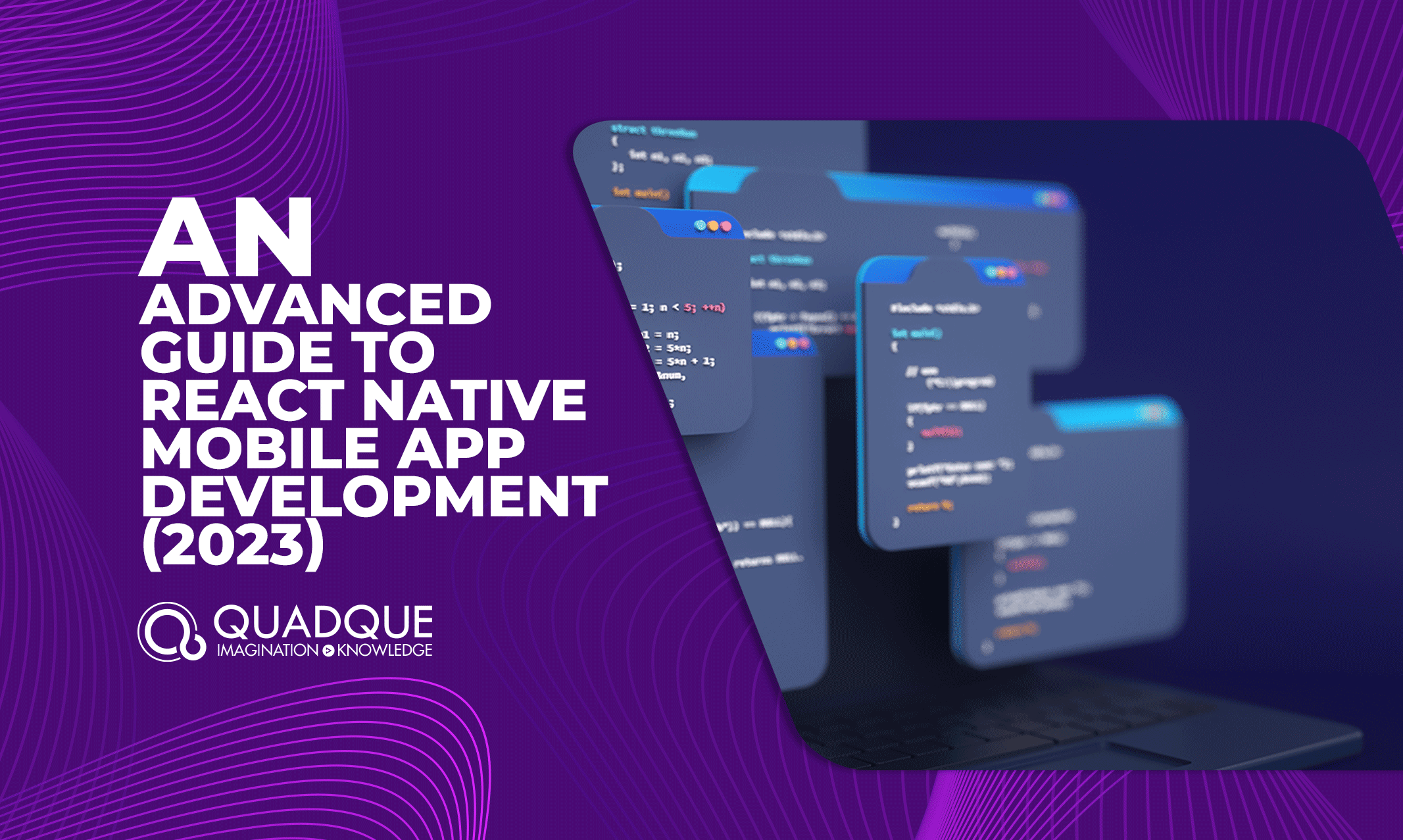
complete react native guideline in 2023
We all know about React Native. It’s an extremely popular platform today for creating powerful mobile applications. Developers all over the world prefer this platform for its convenient features and handy tools. So today, we’ll discuss advanced mobile app development on React Native.
What is React Native?
The open-source React Native technology was developed by Facebook for mobile applications. It is built on React, a well-known JavaScript user interface package. React Native enables developers to create mobile apps for the iOS and Android platforms using only JavaScript and React syntax. With React Native, developers can create code once and use it for both the iOS and Android platforms because it takes the “learn once, write anywhere” approach. React Native has the ability to use native components for each platform. As a result, developers can create apps that have the appearance and feel of native apps. Further benefits of React Native include quicker development times, convenient reloading and strong support for third-party libraries.
Pros of Using React Native
React Native has grown in favor in recent years as a result of its simplicity, adaptability and affordability. Companies wishing to create powerful mobile applications for multiple platforms are extensively using React Native. React Native offers several major advantages, including:
Cross-platform development: React Native enables programmers to create mobile applications that run on both iOS and Android operating systems. For enterprises, this strategy drastically cuts down on development time and expense.
Code reuse: By allowing developers to reuse the code across several platforms and projects, React Native’s component-based architecture increases the effectiveness of the development process. This feature saves a great deal of time.
Faster development: Hot reloading is one of the capabilities offered by React Native that enables developers to see changes immediately without having to completely rebuild the application. As a result, cycles of development are shorter.
Native performance: Because React Native leverages native components, its apps operate quickly and smoothly, giving users a native-like experience. This handy feature is crucial for mobile app development and developers are able to create stunning apps.
Strong developer community and support from third parties: React Native has a sizable developer community that contributes to the framework’s development and offers support. In addition, a large number of third-party libraries and plugins are available. Cost-effective: React Native enables the creation of cross-platform applications from a single codebase, saving organisations money on development expenses and lowering the overall cost of app development.
An Advanced Guide to React Native Mobile App Development
Let’s take a quick look at some of the main topics that you should master for creating amazing mobile apps on React Native.
1. Basics of React Native
First and foremost, you should have a good idea of the basics of this platform. It’s a good idea to recap the basics before moving on to the more advanced topics. Before diving into the advanced lessons, you should go through a brief overview first.
2. Animations in React Native
Understanding animations in React Native should be one of your first priorities. You should know how to create animations using the Animated API. You should also learn how to implement animations in real-world scenarios.
3. Maps and Location-based services
Most apps use location-based services these days. So don’t forget to learn about integrating maps in your React Native app. You should clearly understand the use of geolocation in the platform and know how to implement real-time location tracking.
4. Camera and Image Processing
Knowing how to access device cameras in React Native is crucial for developing advanced camera-based apps. In this step, focus on image processing in React Native. Developers should also be able to implement real-time image processing.
5. Push Notifications
Understanding how push notifications work with other features is extremely important. So you should be comfortable implementing this feature. Don’t forget to learn how to send push notifications from the backend.
6. Reactive Programming
You should have a thorough understanding of Reactive Programming. Focus on lessons like implementing Reactive Programming using React Native and RxJS. There are hundreds of online tutorials that can teach you a lot about this.
7. Redux and MobX
Many developers overlook Redux and MobX. Most of them do not know how to implement Redux and MobX in React Native. It can be challenging to master these topics. However, we highly suggest mastering Redux and Mobx and learning the best practices for state management.
8. Testing in React Native
Testing is a vital step in any mobile app development process. Get a clear understanding of how unit testing works in React Native. Make sure that you are well-versed in end-to-end testing as well. Experiment with different features during the testing process.
9. Performance Optimization in React Native
Performance optimization ensures that your app gives the best possible results. So you should follow the best practices for performance optimisation. You should also be able to measure and improve the performance of different types of apps.
10. Deployment and Continuous Integration
You should learn the steps for deploying the React Native app on different platforms (iOS, Android, Web). Stay up-to-date with the latest updates on these platforms. You should also learn how to implement continuous integration using tools like CircleCI and Jenkins.
Conclusion
We highly suggest recapping any topic that you may find difficult. Once you have mastered these topics, you can proceed to the next steps for more advanced React Native development. Don’t hesitate to experiment with different tools and ideas throughout the process. Today, we have covered advanced topics in React Native app development. We have assumed that the participants have a basic understanding of React Native. Please feel free to contact us if you have any queries regarding React Native mobile app development. Good luck!
Recent Posts
- Sustainable Graphic Design for 2024 and Beyond
- Profit Power: Maximizing Revenue Growth with CRM Software
- Medical and Elderly Care in the UK: Strategies for Sustainable Growth
- Securing Educational Excellence: IT Support for the Digital Era
- Tech Transformation: The Untold Story of Bangladesh’s Innovation Hub
Recent Comments
Latest Post
Categories
- AI
- Biometric
- Blockchain
- Cloud Computing
- CRM
- custom software
- Cybersecurity
- Data Analysis
- Datacenter Management
- Designer
- Digital Marketing
- Education
- health care
- Informative
- ISP Management
- IT Procurement
- IT Recruitment
- IT Support
- Mobile App
- Network Management
- Robotics Landscape
- SAP ERP
- SEO
- Structured Cabling
- Tech Australia
- Tech bangladesh
- Technology
- tourism
- Uncategorized
- Web Development


